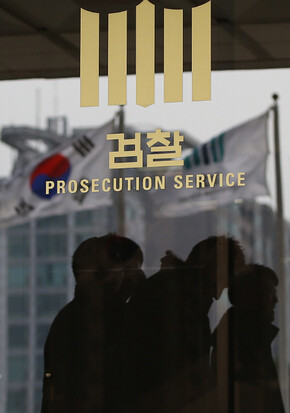hankyoreh
Links to other country sites 다른 나라 사이트 링크
Report issues damning assessment of Pres. Park’s investigative reforms

By Park Ki-yong, staff reporter
On Apr. 1, the Judicial Monitoring Center operated by People’s Solidarity for Participatory Democracy (PSPD) released the Prosecution Report for the First Year of the Park Geun-hye Administration, analyzing the major investigations carried out by the prosecutors and the high-ranking appointments made during Park’s first year in office. The civic group publishes the report each year.
PSPD’s assessment is stinging. Before the 2012 presidential election, Park made seven pledges about reforming the prosecution. She promised to introduce a permanent special prosecutor system, require appointments for prosecutor general to be approved by the National Assembly, limit the assignment of prosecutors to the Ministry of Justice, block corrupt prosecutors from setting up law firms, abolish the central office of investigation at the Supreme Prosecutors’ Office, strengthen the grand jury system, and adjust the investigative power of the prosecutors and the police.
The PSPD report states that while Park ostensibly achieved some of the reforms - such as requiring legislative approval for prosecutor general appointments, shutting down the central office of investigation, and setting up a permanent special prosecutor system - a detailed assessment shows that they were reforms in name only.
The central office of investigation, which had been directly controlled by the prosecutor general, was closed to prevent the investigations by the prosecutors being abused for political ends. However, this was largely rendered meaningless because the office was replaced by a department inside the Supreme Prosecutors’ Office, which oversees and supports the special investigation wing of Seoul Central District Prosecutors’ Office, the report said.
The report also roundly criticized the permanent special prosecutor system, which turns out to be less than permanent. The system is little different from the special prosecutor system that preceded it, the report said, since it is only brought to bear occasionally, when it is needed. Another serious weakness is that assigning a special prosecutor requires the approval of the powers that be, including the ruling party, leading the report to denounce it as “a fraudulent system that deceives the public.”
In addition, there has been no progress whatsoever on the pledges to flesh out the grand jury system or to adjust the investigative powers of the prosecutors and the police.
The report also brought critical attention to the fact that the appointment of former prosecutors Kim Ki-choon and Hong Kyung-shik as presidential chief of staff and secretary for civil affairs during the first year of Park’s administration have made it possible for the Blue House to exert direct and indirect influence on investigations by the prosecutors.
“The prosecutors appeared to be regaining public trust at first with their work to recover the outstanding money owed by former president Chun Doo-hwan and an investigation into the chairmen of South Korea’s chaebol,” the report said. “But other investigations - into the illegal leak of the transcript for the 2007 inter-Korean summit, the National Intelligence Service’s manipulation of public opinion before the 2012 presidential election, and the fabrication of evidence in an espionage trial -- were characterized by partiality and abuse of the prosecutors’ power.”
“The prosecutors are still politically motivated,” said Seo Bo-hak, chief of PSPD’s Judicial Monitoring Center and a professor at the law school at Kyunghee University. “The prosecutors are going down the wrong road toward an unchecked monopoly on power.”
Please direct questions or comments to [english@hani.co.kr]

Editorial・opinion
![[Column] Park Geun-hye déjà vu in Yoon Suk-yeol [Column] Park Geun-hye déjà vu in Yoon Suk-yeol](https://flexible.img.hani.co.kr/flexible/normal/500/300/imgdb/original/2024/0424/651713945113788.jpg) [Column] Park Geun-hye déjà vu in Yoon Suk-yeol
[Column] Park Geun-hye déjà vu in Yoon Suk-yeol![[Editorial] New weight of N. Korea’s nuclear threats makes dialogue all the more urgent [Editorial] New weight of N. Korea’s nuclear threats makes dialogue all the more urgent](https://flexible.img.hani.co.kr/flexible/normal/500/300/imgdb/original/2024/0424/7317139454662664.jpg) [Editorial] New weight of N. Korea’s nuclear threats makes dialogue all the more urgent
[Editorial] New weight of N. Korea’s nuclear threats makes dialogue all the more urgent- [Guest essay] The real reason Korea’s new right wants to dub Rhee a founding father
- [Column] ‘Choson’: Is it time we start referring to N. Korea in its own terms?
- [Editorial] Japan’s rewriting of history with Korea has gone too far
- [Column] The president’s questionable capacity for dialogue
- [Column] Are chaebol firms just pizza pies for families to divvy up as they please?
- [Column] Has Korea, too, crossed the Rubicon on China?
- [Correspondent’s column] In Japan’s alliance with US, echoes of its past alliances with UK
- [Editorial] Does Yoon think the Korean public is wrong?
Most viewed articles
- 1‘We must say no’: Seoul defense chief on Korean, USFK involvement in hypothetical Taiwan crisis
- 2N. Korean delegation’s trip to Iran shows how Pyongyang is leveraging ties with Moscow
- 3Amnesty notes ‘erosion’ of freedom of expression in Korea in annual human rights report
- 4‘Weddingflation’ breaks the bank for Korean couples-to-be
- 5[Reportage] On US campuses, student risk arrest as they call for divestment from Israel
- 6[Column] Park Geun-hye déjà vu in Yoon Suk-yeol
- 7Korea sees more deaths than births for 52nd consecutive month in February
- 8[Editorial] New weight of N. Korea’s nuclear threats makes dialogue all the more urgent
- 9Will NewJeans end up collateral damage in internal feud at K-pop juggernaut Hybe?
- 10[Guest essay] The real reason Korea’s new right wants to dub Rhee a founding father